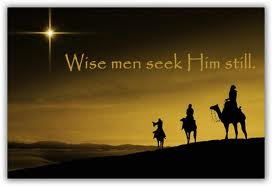Christmas is coming, the goose is getting fat, and I think it's about time I shared a thought or two on the Christmas story.
Just a reminder that these thoughts are my thoughts, and are not necessarily doctrine or scripture or Christmas canon. But I do think they're cool, and I hope that by sharing another perspective, it may spark thoughts of your own.
So, one of the components of the traditional Christmas story is the visit of the three wise men. This is one of the greatest examples of how culture and tradition can override the actuality of what we know and what we don't know, because the culturally accepted story goes like this:
Three wise men, named Melchior, Caspar, and Balthasar, traveled from the East, following the star that was given as a sign of the birth of Christ. They arrived at the manger and bore gifts of frankincense, gold, and myrrh to the young King. Legend also holds that the wise men were of various ethnic origins.
This story and some variations is a part of many different celebrations worldwide.
 |
1 Now when Jesus was born in Bethlehem of Judæa in the days of Herod the king, behold, there came wise men from the east to Jerusalem, 2 Saying, Where is he that is born King of the Jews? for we have seen his star in the east, and are come to worship him.
9 When they had heard the king, they departed; and, lo, the star, which they saw in the east, went before them, till it came and stood over where the young child was. 10 When they saw the star, they rejoiced with exceeding great joy. 11 ¶And when they were come into the house, they saw the young child with Mary his mother, and fell down, and worshipped him: and when they had opened their treasures, they presented unto him gifts; gold, and frankincense, and myrrh.
So from that, about all we know is that there was an unnumbered group of wise men who came from the east, following the star. They arrived at a house and gave gifts of gold, frankincense, and myrrh.The rest is speculation.
Here comes my speculation:
Because the Bible is so unspecific about the identities of these wise men, and
Because the Bible often refers to all humans as 'mankind' or 'man' (such as "Peace, goodwill to men,"), and
Because all are invited to come unto Christ and worship him,
I suggest the idea that the group of wise men could have included women and children as well.
The visitors from the east could well have been a family.
Whether this is a valid theory or just a neat idea isn't all that important. But I enjoy the thought because it brings another example of the importance of family into the Christmas story, and supports the fact that Christmas is a family holiday. Whether you are religious or not, Christmastime is one of the greatest times to create memories with family. And spending time with the family is indeed a wise thing to do.
I hope that we each can spend time during the holiday creating joy and goodwill with our families. I believe that the best way to do this is by centering the family on Christ, as the wise men may have done millenia ago.
Happy Christmas, all.
 |
